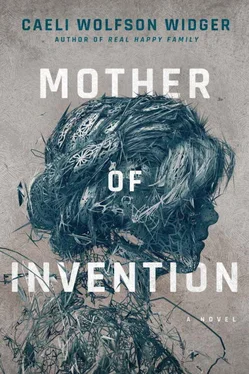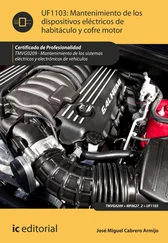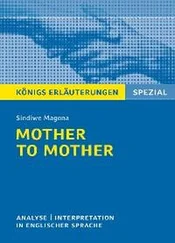She walked in nothing but thin trouser socks, carrying her boots, all the way across campus to her dorm. It was April but the night was still cold, and the soles of her feet were numb and black with dirt by the time she opened her door in Durfee Hall. Violet didn’t even stir as Irene entered.
Three months later, when Irene left New Haven with the baby, a girl, strapped into the back of the Toyota Highlander handed down from her father, she was glad she’d never learned the father’s name. If he’d had a more distinct identity in her mind, she might have felt more compelled to find him. To tell him.
But why would he have wanted his life disrupted by such a bizarre event as becoming an unintentional father in the span of nine weeks? Who wanted direct association with a freak occurrence? Irene had done Ryan/Bryan a great favor, she thought, as she steered her dad’s old SUV south on I-95 in the first of the thirty hours between New Haven and Austin, her hands trembling on the wheel. She hadn’t yet told her parents. Hadn’t yet told anyone. She’d withdrawn from Yale right after she’d gone to Planned Parenthood to verify the positive result of her home pregnancy test. She’d also planned to schedule an abortion. Just a few weeks had passed since the Ryan/Bryan night and her missed period, so she knew she wasn’t very far along.
Except that the nurse at Planned Parenthood (she was too embarrassed to return to her usual gynecologist, under the circumstances, since she’d refused birth control during her last visit) informed Irene that she was fourteen weeks pregnant. Irene stared at the ultrasound screen, unable to speak as the nurse pointed out all the standard features of a fourteen-week-old fetus.
“It’s not possible,” Irene had said finally. “It’s just not.”
“It’s common to feel that way,” the nurse said sympathetically. “But you’re not alone here, and we can talk through your options. Termination is still available if…”
But Irene, who had always been vehemently pro-choice, couldn’t bring herself to do it. Not now, when she could see toes and fingers and a nub of a nose.
That afternoon, she submitted a form to the college dean, requesting an immediate leave of absence for personal reasons.
A week later, she stared at the latest ultrasound in horror and awe. At the thing ballooning inside her, limbs and fingers already visible, the sex organs fully formed just five weeks after the night of the party. A girl. Developing normally but on fast-forward. It was more than Planned Parenthood was equipped to handle. She checked into Brigham and Women’s Hospital.
Then, just over two months after Irene had rowed in the Essex Regatta, a nurse wheeled her into an operating room, flanked by an anesthesiologist and an obstetrician specializing in high-risk deliveries. The C-section was over in forty minutes, free of complications. The nurse and doctors couldn’t conceal their amazement. A healthy baby girl, normal but for the shape of her head. The tiny creature felt wrong in Irene’s arms, writhing and squirming, sucking greedily at her plastic bottle, guzzling the foul-smelling formula, because Irene couldn’t bring herself to try to breastfeed. Mostly, though, she’d held herself together, despite her scrambled mind and frozen heart. She’d gone through the motions. Had refused painkillers for her throbbing incision. Learned to feed, to bathe, to change. She was capable. But the situation felt like pure dream. A punishment for a crime she hadn’t committed, a long hallucination. Yet the baby continued to exist. Continued to wail and feed and sleep. And the sorrow settled over Irene, webbed and clingy, impossible to see through. Blocking the light, blotting her comprehension. Blunting her ability to feel what she knew she should feel for the tiny, needful thing.
Her baby.
But it was impossible to see the girl as her own. It had all happened too quickly, too strangely.
She couldn’t stay here.
It was near the twelfth hour of her drive from New Haven to Austin that she’d cracked. The child yowled in the back seat, inconsolable despite many bottles and the vibrating pad Irene had purchased at Target and shoved under her car seat, guaranteed to soothe.
But the baby would not be soothed. She bleated on into the night, Irene weeping at the wheel, searching the radio desperately for something that might bring them an iota of the comfort they deserved.
She hadn’t wanted this. Not in her wildest imaginings. She was twenty years old. Children were nowhere near her radar, nothing but a vague notion, like a mortgage or gray hair. Probably, someday.
After so many other things had happened.
Her daughter was two weeks old now. Six pounds, one ounce, declared healthy by the OB who had delivered her, by the NICU neonatologist, by the pediatric geneticist. Her doctors released her from the hospital reluctantly, along with free blankets and flats of formula and a protective helmet for the baby. She was to keep the baby’s protective helmet on at all times, except when she removed it once a day to apply a salve. The helmet was designed to protect the skull and her ultradelicate fontanel and to gently reshape it over time. It looked like an old-fashioned swim cap and covered up the tufty dark hair the girl had been born with, making her pinched face even more pronounced. As if she’d been squeezed at the cheeks with two viselike hands and frozen that way.
It was hard for Irene to look at her.
She promised her doctors she’d return with the baby for follow-up appointments every two weeks; the aberrant nature of her pregnancy demanded close postpartum monitoring of them both. The doctors seemed desperate to see her again. She assured them she’d be back and allowed a front desk person to tap a half dozen future appointments into a computer, which Irene pretended to note in her planner. She had no intention of ever setting foot in Brigham and Women’s Hospital again.
She drove south from Boston, on I-95, through Virginia and the Carolinas, then west toward Tennessee. Toward Texas. To her parents. They believed she was simply coming home for summer break. They knew nothing of her leave of absence.
Nothing of the baby.
Now: July, 4:30 a.m. Irene wasn’t sure which day of the week it was. She’d lost track. Driven through the night. The baby had slept for a stretch after Irene had given her a bottle, but she was awake now, before the sun, screaming her head off.
Irene couldn’t take the pain. Hers or the baby’s. She didn’t know what to do with it. With herself or the girl. All she knew was that she could not do it .
She cracked the windows, hoping that the sound of the air in the car might placate the baby until she could bring herself to pull over. Feed her, change her.
And for a moment, the swirling helped. The child’s cries subsided, receding back into her throat with gasping, staggered sounds. The cool morning filled the car. The wind’s whipping sound drowned out the classical music Irene had found on the radio. Inside the white-noise moment of silence, a glimmer of peace.
She saw a sign for a rest stop, pulled over, scooped powder into the bottle, felt the usual pang of guilt for not breastfeeding, added water, shook. Climbed gingerly into the back seat, wincing at the throb the motion sent to her C-section incision, and sat beside the car seat. Fed her four ounces of formula, until her eyelids drooped again. She decided not to change her but to apply the protective salve to her scalp instead. One mechanical chore was the most she could handle.
She squinted her eyes and crossed them, to blur her vision while she removed the helmet and spread the ointment around the baby’s cleft, just as the NICU nurses had demonstrated (improvising, they admitted, based on the protocol used for preemies). She was then supposed to wait ten minutes before putting the helmet back on, so that the baby’s scalp could absorb the medicine.
Читать дальше












